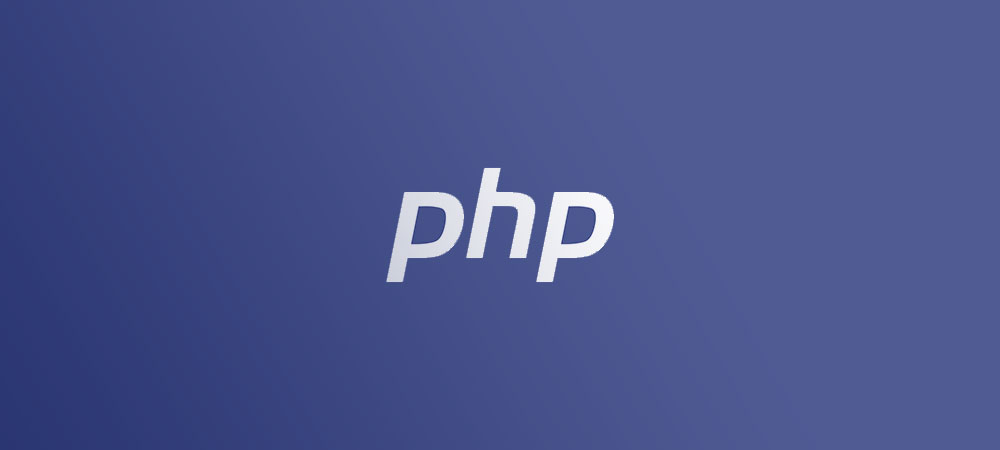Comprehensive Manual on PHP End-of-Life (EOL) and Supported Versions 2023
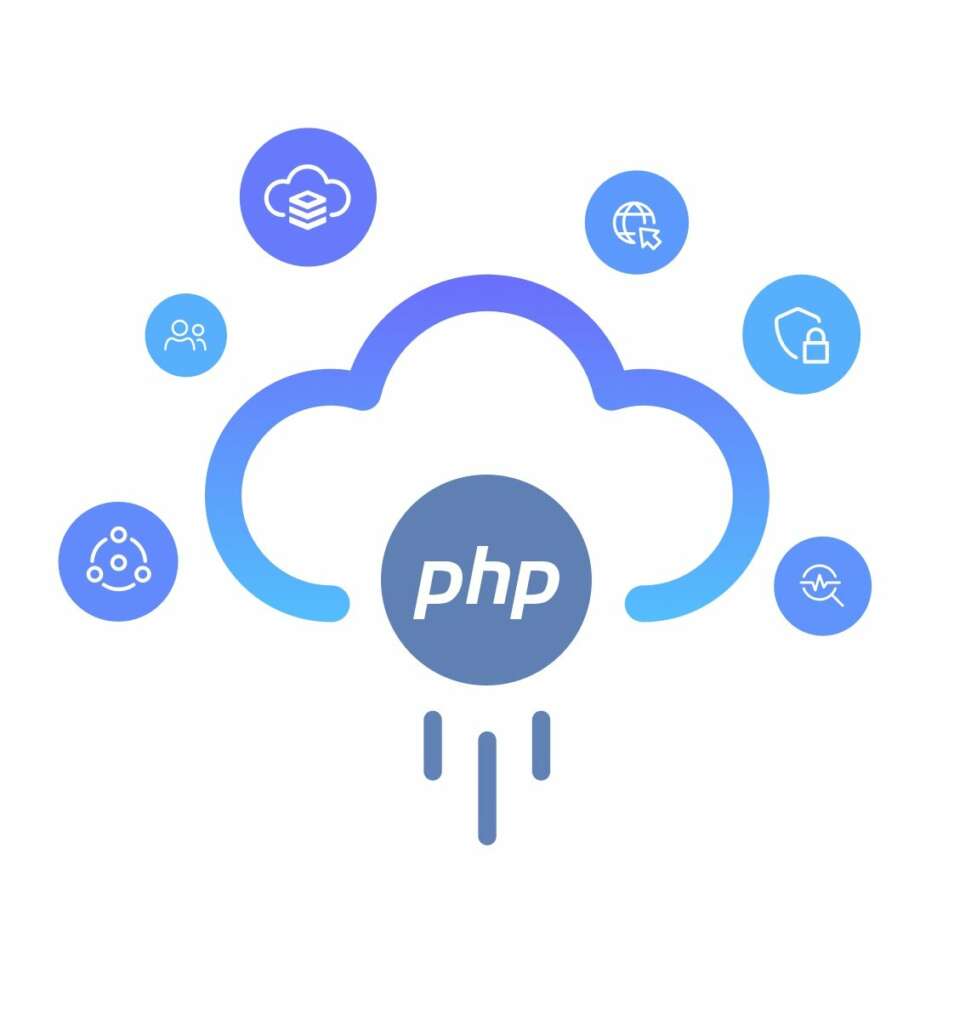
PHP has become indispensable to the web development industry. Its popularity is indisputable, with over 77.6% of websites that employ a server-side programming language utilizing PHP. It’s embraced by individual developers and plays a pivotal role in the WordPress ecosystem, empowering the entire CMS. However, despite its widespread adoption, many businesses, developers, and hosts have lagged behind in supporting the most recent PHP versions.
Startling statistics reveal that numerous websites still rely on outdated PHP, leaving themselves vulnerable to security risks and subpar performance.
This article will delve into the significance of utilizing the latest PHP and furnish a comprehensive guide for end-of-life (EOL) and PHP-supported versions in 2023. Additionally, as necessary, we will address the perils of using outdated versions, the advantages of leveraging the latest supported versions, steps to upgrade PHP versions, and frequently asked questions.
Upon completing this guide, you will have a clear understanding of why maintaining currency with the latest version is crucial.
Jump To...
Explaining the Active Maintenance Phase and End of Life Period
PHP, akin to any software, undergoes a comprehensive support lifecycle encompassing various phases, from its initial release to eventual End-of-Life (EOL). Grasping the active support lifecycle and EOL PHP version is imperative to ensure you leverage the most secure and updated version.
The active, long-term support and lifecycle for PHP commence with the General Availability (GA) release date. The GA release date marks the debut of the first stable release of a new version and is upheld for two years. Throughout this long-term support period, PHP receives a stream of security patches and updates addressing security risks and bug fixes. These updates are rolled out in regular point releases, guaranteeing that the software remains secure and operational.
Subsequent to the initial two years, a minor release of PHP transitions into the Security Support phase, during which only security fixes are provided for an additional year. This phase of minor release support, dedicated solely to security fixes, is termed the “Security Fix Only” phase. It is strongly advised to upgrade to a newer version during this phase, as the minor release will no longer receive bug fixes, rendering it potentially vulnerable.
End-of-Life (EOL) Complications
Following three years, PHP reaches its End-of-Life (EOL) stage and ceases to receive support. Subsequently, no further updates, encompassing security patches and bug fixes, are issued, rendering the software susceptible to both known and undisclosed critical security vulnerabilities. Consequently, it becomes imperative to transition to supported versions preceding EOL to avail oneself of security patches and safeguard the sustained security and functionality of your website or application.
The Progression of PHP Releases
Here, we will furnish a compilation of significant versions encompassing all PHP releases to date, along with the currently upheld versions.
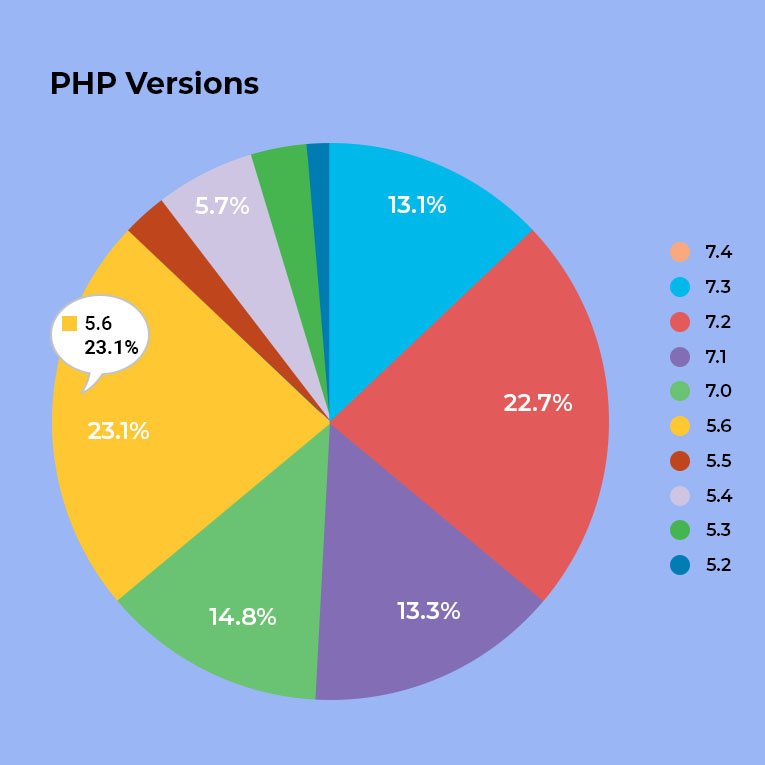
Data Source: WordPress PHP Statistics
PHP 1 (1995): Marking the inaugural release of PHP, crafted by Rasmus Lerdorf, this iteration comprised a basic set of Common Gateway Interface (CGI) scripts developed in the C programming language for Lerdorf’s personal utilization.
PHP 2 (1997): Embarking on a comprehensive rewrite from its predecessor, PHP 2 introduced a plethora of novel functionalities, including support for dynamic HTML generation and database connectivity.
PHP 3 (1998): This iteration expanded its horizons by incorporating support for object-oriented programming (OOP) and enhancing compatibility with Windows operating systems.
PHP 4 (2000): Introducing notable performance enhancements, PHP 4 ushered in novel features such as the Zend Engine, a scripting engine designed to furnish a high-performance execution environment for all PHP applications. PHP 4 has since ceased development, with no further major versions or security updates slated for release.
PHP 5 (2004): Representing a significant leap from PHP 4, PHP 5 brought forth support for a multitude of new features, including exceptions, iterators, and refined OOP support.
PHP 5.6 (2014): Serving as the culminating update within the PHP 5.x series, PHP 5.6 was released in 2014, introducing functionalities like constant scalar expressions, variadic functions, and argument unpacking. Extended support for PHP 5.6 persisted until the conclusion of 2018.
PHP 6 (development halted in 2010): Initially slated to incorporate support for Unicode and novel database features, PHP 6 faced eventual cessation of development due to a confluence of technical and community obstacles.
PHP 7.0 (2015): Making waves as the final major release of PHP’s preceding version, PHP 7.0 heralded updates aimed at bolstering performance, including the implementation of a revamped edition of the Zend Engine, resulting in significantly enhanced speed and efficiency. It also introduced fresh features like scalar-type declarations and the spaceship operator.
PHP 7.1 (2016): Released in 2016, PHP 7.1 introduced enhancements such as nullable types, iterable types, and the ability to catch multiple exceptions. Extended support for PHP 7.1 endured until the culmination of 2019.
PHP 7.2 (2017): This major iteration of PHP brought forth features like object type hinting, the count() function accommodating arbitrary expressions, and support for negative string offsets. Extended support for PHP 7.2 was maintained until the end of 2020.
PHP 7.3 (2018): PHP 7.3 introduced features like trailing commas in function calls, flexible heredoc and nowdoc syntax, and enhanced performance for variable assignment. Extended support for PHP 7.3 persisted until the conclusion of 2021.
PHP 7.4 (2019): Marking the final iteration of PHP 7.4, this version introduced functionalities such as typed properties, arrow functions, and the option to utilize curly braces to define functions. Extended support for PHP 7.4 spanned until the end of 2022.
Presently Maintained PHP Editions

Source: PHP Supported Versions
PHP 8.0 (2020): PHP 8.0 brought forth numerous fresh features and enhancements, including just-in-time (JIT) compilation for expedited execution, union types, and named arguments. It also ushered in disruptive alterations for certain older codebases, necessitating developers’ awareness of these modifications during the upgrade process.
PHP 8.1(2021): PHP 8.1 stands as a pivotal update to the PHP language unveiled on November 25, 2021. This release incorporates a plethora of new functionalities, such as read-only properties, fibers, enums, performance enhancements, intersection types, and more.
PHP 8.2 (2022): PHP 8.2 signifies a noteworthy advancement in the PHP programming language’s evolution, showcasing an array of novel features. These encompass read-only classes, phased-out dynamic properties, standalone null, false, and true types, alongside notable performance optimizations.
The PHP 7.4 Maintenance Period
PHP 7.4 made its debut on November 28, 2019, introducing a plethora of new features and performance enhancements compared to its predecessor. As highlighted earlier, akin to all software, the active support phase for versions is finite. Hence, keeping abreast of when a version will approach its end-of-life (EOL) is paramount.
For PHP 7.4, the active support phase concluded on November 28, 2022. Consequently, PHP 7.4 ceased to receive security patches, security support, active support phase assistance, or bug fixes from the PHP community. This indicates that users persisting with PHP 7.4 post its End-of-Life date expose their applications to potential security vulnerabilities and other security-related issues.
It is strongly recommended to upgrade to a newer version prior to its end-of-life date to ensure the continued security and currency of your applications. Doing so will enable you to receive updates for critical security concerns and bug fixes as they are released.
Adverse Outcomes of Continuing PHP 7.4 Beyond End of Life
Continuing to use PHP 7.4 beyond its end-of-life (EOL) date can have adverse effects on your WordPress site or PHP applications. Here are some of the potential risks:
Security vulnerabilities: PHP 7.4 will no longer receive security updates after its EOL date, leaving your website or PHP applications vulnerable to exploitation by hackers or malicious actors who could exploit any discovered vulnerabilities.
Compatibility issues: Web hosting providers may discontinue support for older PHP versions, making it challenging to find a compatible hosting environment for PHP 7.4. Moreover, newer PHP versions may introduce features incompatible with older codebases, leading to errors or compatibility challenges.
Reduced website stability: PHP 8, being a major release with significant changes and no legacy support, may cause decreased application stability when upgrading from PHP 7.4, especially when aligning with the compatibility requirements of the latest WordPress 6.1.
Lack of support: With the EOL status, developers and support teams may cease providing active assistance for PHP 7.4, making it difficult to resolve any issues or bugs encountered in your codebase.
Missed features and improvements: Continuing with PHP 7.4 means foregoing any new features or enhancements introduced in subsequent PHP versions, potentially placing you at a disadvantage compared to competitors leveraging the latest PHP functionalities.
Utilizing PHP 7.4 beyond its EOL date poses risks such as security vulnerabilities, compatibility challenges, lack of support, and missed advancements. To mitigate these risks, it is advisable to upgrade to a newer PHP version, as PHP 7.4 has reached the end of its lifecycle.
Motives for Updating Your PHP Version
For your website, transitioning to the latest PHP update presents numerous benefits, including heightened visibility and enhanced assistance. You ought to update PHP for the subsequent five rationales:
1. Bug Resolutions
Each PHP iteration incorporates bug resolutions that augment the language’s functionality and reliability. By transitioning to the latest PHP version, you can guarantee seamless operation for your website, devoid of interruptions or glitches.
2. Improved Security Measures
Outdated versions may expose your website to unremedied security loopholes, facilitating hackers in identifying and exploiting vulnerabilities to compromise your site’s integrity. Updating to the latest PHP iteration reduces the likelihood of a security breach, as it grants access to the latest security enhancements and encryption protocols, bolstering your website’s defense against potential threats.
3. Ongoing Maintenance
Over time, older versions attain end-of-life status, signifying cessation of support from the PHP community. This may lead to difficulties in obtaining assistance or setting up staging environments to address potential issues. By transitioning to the latest PHP version, you can rest assured of access to active community support and resources, including bug fixes, security enhancements, and novel features.
4. Fresh Functionality
With each new PHP update, the language’s functionality, performance benefits, and efficiency are enhanced through the addition of new features and other optimizations. These fresh capabilities can contribute to an enhanced user experience for website visitors and aid developers in crafting more effective and efficient code. For example, PHP 8 introduces features such as named arguments, union types, and attributes, which further elevate the language’s capabilities.
5. Enhanced Performance
Each PHP release encompasses performance enhancements that augment the speed and functionality of your website. This can lead to higher conversion rates, enhanced user engagement, and quicker loading times. For instance, PHP 8 introduces a new just-in-time (JIT) compiler, which significantly enhances the efficiency of specific types of code, further enhancing overall performance.
Ensure Your Hosting Provider Supports the Most Recent PHP Releases
The official WordPress requirements now recommend that web hosting services operate on PHP 7.4 or newer. Thus, it’s crucial to ensure your host supports the latest PHP versions.
Here are steps you can take to verify that your web hosting service supports the latest PHP versions:
Check your current PHP version: Before upgrading, ascertain the PHP version your website is currently running. Access the control panel of your hosting account and locate the PHP version listed in the settings or configuration section.
Research your web host: Determine if your hosting provider supports the latest PHP versions. Check their website or reach out to their support team for information regarding PHP version support.
Upgrade your hosting plan: If your current hosting plan doesn’t support the latest PHP versions, consider upgrading to a higher-tier plan that does.
Utilize a PHP version checker: Employ a tool to verify your website’s compatibility with the latest PHP update. This tool can scan your website’s code and generate a report indicating which version your website is compatible with.
Test your website post-upgrade: After transitioning to the latest PHP update, thoroughly test your website to ensure everything functions correctly. This entails checking all features, plugins, and themes to confirm compatibility with the new PHP version.
By adhering to these steps, you can confirm that your web hosting service supports the latest PHP versions, thus maintaining the security and efficacy of your website.
5 Significant Advantages of Upgrading to PHP 8 for Your WordPress Website
Migrating to PHP 8 can offer substantial advantages for your WordPress platform. Here are five primary benefits of transitioning to PHP 8 for your WordPress site:
Full Compatibility with WordPress 6.1
The latest WordPress 6.1 version mandates PHP 8 for optimal performance. Transitioning to PHP 8 ensures full compatibility of your WordPress site with the latest WordPress release, enabling utilization of all its new features and enhancements.
Decreased Vulnerability Surface
Obsolete PHP versions are inherently more vulnerable to security threats, heightening the risk of cyberattacks across all websites. Transitioning to PHP 8, with its enhanced security features and robust encryption mechanisms, significantly reduces your attack surface, bolstering the overall security posture of your website.
Improved Speed and Efficiency
Thanks to PHP 8’s significant speed enhancements, your WordPress site will operate more efficiently and exhibit faster load times compared to older versions. This improved performance can lead to better user experiences and increased engagement levels among visitors to your website.
Streamlined Development Process
PHP 8 introduces a plethora of new features and enhancements that streamline development and enhance practicality. It boasts new grammar features and improved error handling, simplifying the process for developers to craft clean, efficient code.
Reduced Likelihood of Encountering WordPress Errors
Incompatible PHP versions often underlie numerous WordPress issues. Transitioning to PHP 8 diminishes the likelihood of encountering compatibility issues with WordPress plugins and themes, thus mitigating potential errors. Ensuring smooth operation of your website can save you time and alleviate headaches.
Ensuring Your Website's Future Viability
Staying abreast with the latest PHP version is crucial for ensuring the smooth operation of WordPress and other web technologies, as newer versions are typically required for optimal functionality. By promptly upgrading to PHP 8, you future-proof your website and ensure compatibility with emerging technologies as they are introduced.
How to Verify the Present PHP Version of Your WordPress Site?
Multiple approaches are available to ascertain the version fueling your WordPress site. If you aim to identify your site’s present version, here are several methods to achieve that:
Employing the WordPress Website Health Utility
WordPress users operating version 5.2 and higher can ascertain their site’s PHP version using the Site Health tool.
To do so, proceed to the Tools > Site Health > Info page within the WordPress dashboard. Then, access the Server tab to review your PHP version.
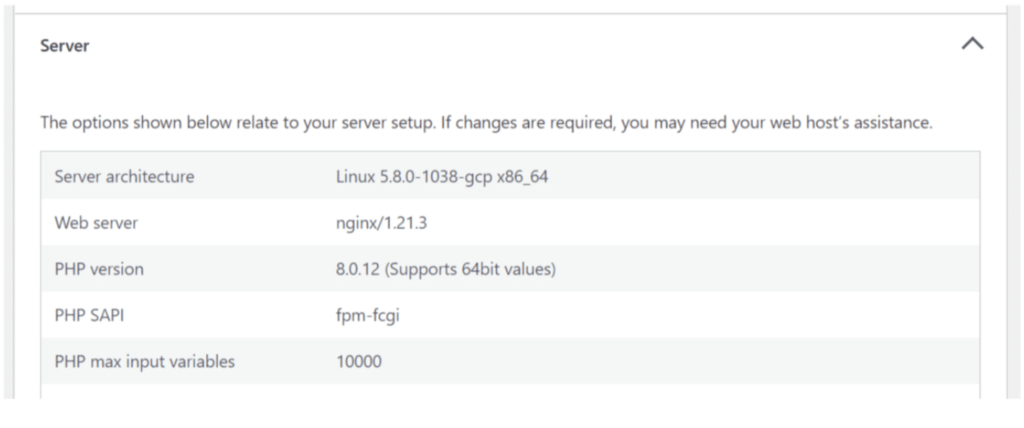
The screen will showcase details regarding your server architecture and web server, unveiling your PHP version, PHP SAPI, and PHP max input variables.
Execute a PHP Script (DIY)
To display your website’s PHP configuration settings, including the current PHP version, you can create a PHP info page. Simply create a new PHP file and insert the following code:
<?php phpinfo(); ?>
Save the file as phpinfo.php and upload it to your website’s root directory. Then, access the file in your web browser by navigating to http://yourdomain.com/phpinfo.php. You should see a page with detailed information about your PHP configuration settings.
Alternatively, if you’re using a locally installed PHP version, you can run the following code.
php -v
This command will display the current PHP version installed on your server.
Utilizing a WordPress Extension
WordPress plugins offer convenient options for obtaining information about your PHP version. “Display PHP Version” stands out as a reliable plugin, enabling you to view your current PHP version directly in the “At a Glance” section of your WordPress admin dashboard.

How to Upgrade Your PHP Edition?
Before we delve into updating your PHP version, it’s prudent to take a few precautions to mitigate potential security risks.
- Verify the minimum requirements: Before proceeding with the PHP version update, ensure that your website’s software and applications are compatible with the new version. Consult the documentation or support pages for your website’s software and plugins to confirm compatibility with the latest PHP version.
- Back up your website: Prior to initiating any updates, create a comprehensive backup of your website files and database to safeguard against any mishaps that may occur during the update process.
Once these precautions are in place, you can proceed with updating your PHP version manually. You have two options:
- Check your hosting control panel: If your hosting provider permits PHP version updates via the control panel, navigate to the PHP configuration settings and select the desired new version.
- Contact your hosting provider: If your hosting control panel does not offer the option to update PHP versions, reach out to your hosting provider’s support team for assistance. They can either update the PHP version for you or provide guidance on how to perform the update manually.
To manually update your PHP version, follow these steps.
Establish a Staging Environment
To minimize the risk of potential software conflicts on your website, it’s prudent to test the PHP update in a staging environment. This enables you to implement changes in a separate, secure environment without affecting your live site.
Setting up a staging site can typically be accomplished through your hosting provider’s control panel, depending on the services they offer. For this tutorial, we’ll demonstrate using the DreamHost panel.
If you’re on a managed DreamHost plan, setting up a staging site is a straightforward process that can be completed in just a few minutes. Simply navigate to WordPress > Managed WordPress > Manage in your control panel to begin.
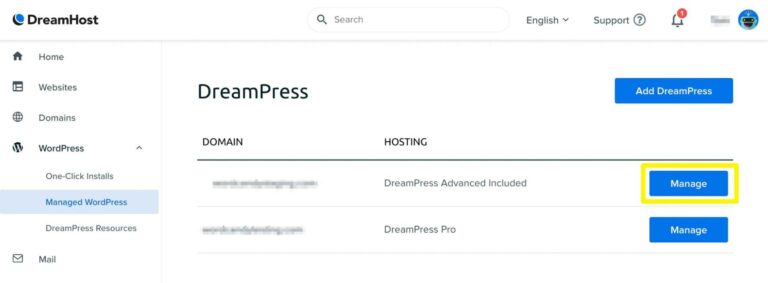
After accessing the Managed WordPress section, proceed to the Staging tab and choose “Create Staging Site.”
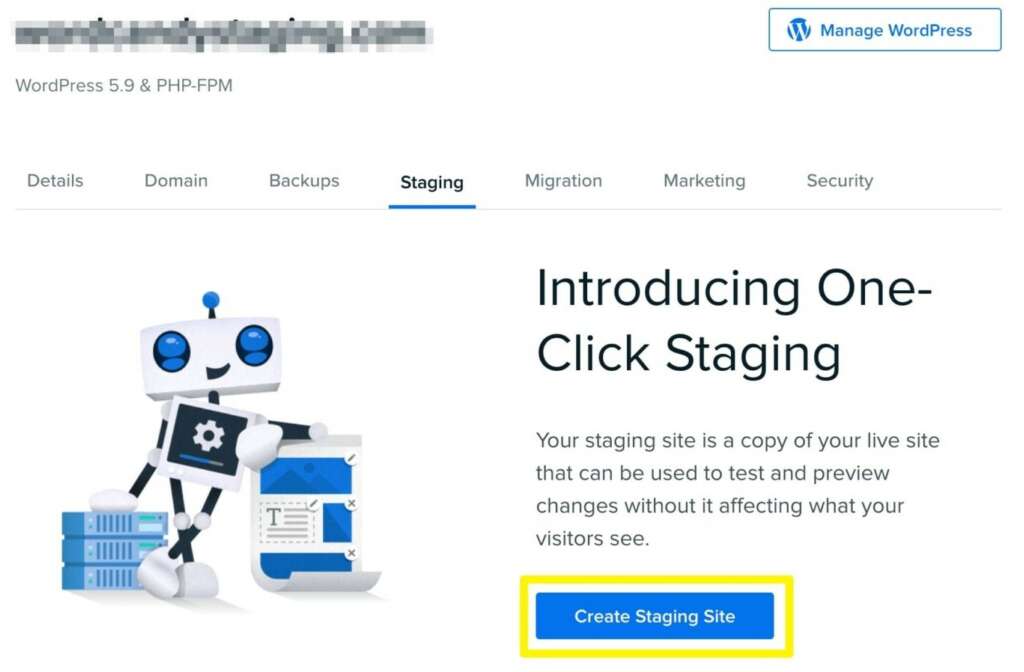
This action will generate a staging site on an automatically created subdomain. Subsequently, you can update to a newer PHP version without impacting the live version of your site.
Alter Your PHP Edition
Most hosting providers offer the capability to change your website’s PHP version via the control panel. The exact process might differ based on the hosting provider, but you should search for options like MultiPHP Manager or PHP Selector.
In the case of DreamHost Staging sites, you can find the Configure PHP section by scrolling down the page. Here, you’ll see your current PHP version and the option to update to the latest version.
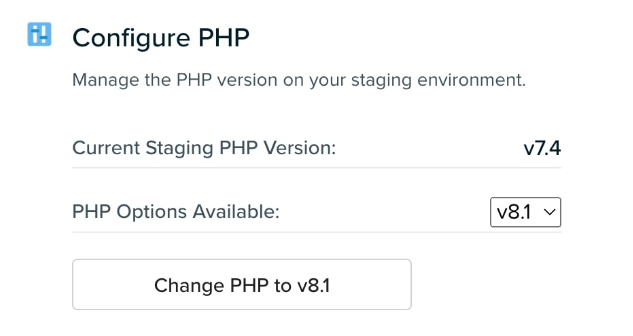
To update on hosting providers like Dreamhost, Digital Ocean, Vultr, or GoDaddy with staging sites, navigate to the “Change PHP” option and select the latest update, such as PHP 8.1. Upon successful completion of the update, the Configure PHP section will verify that your site is now running on PHP 8.1.
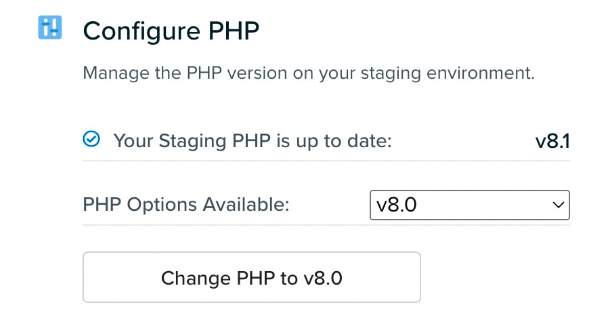
Search for Incompatibilities
After completing the update, it’s essential to review your website’s plugins and themes for any conflicts that may have occurred during the process. It’s not uncommon for issues such as the White Screen of Death or 500 internal server errors to arise following a PHP upgrade.
To ensure everything is functioning correctly, it’s recommended to visit the front end of your site after the update. If you encounter any errors while browsing, it’s crucial to begin troubleshooting to address the issues.
If you encounter errors on your WordPress site, a potential cause could be a plugin conflict. You can initiate troubleshooting by deactivating all your plugins using the Bulk Actions feature on the Plugins page.
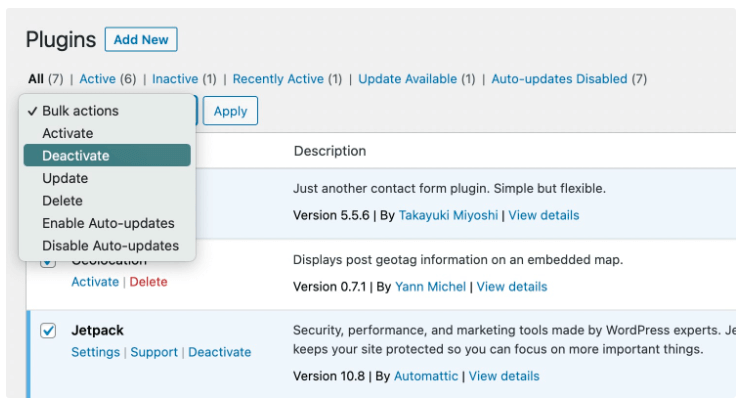
Next, reactivate each plugin individually to verify compatibility and identify any conflicting plugins. You can either download a similar plugin or delete the problematic one if it’s unnecessary.
Deploy Modifications to Your Live Website
Once you’ve successfully updated and tested the changes on your staging site, it’s time to apply the updates to your live website. This process is usually facilitated through your hosting provider’s control panel.
For example, with DreamHost, you can transfer your staging environment and site data to your live site with just one click. However, before proceeding, ensure that any potential conflicts are resolved. Once you’ve addressed any issues, simply click the “Publish Staging to Live” button.
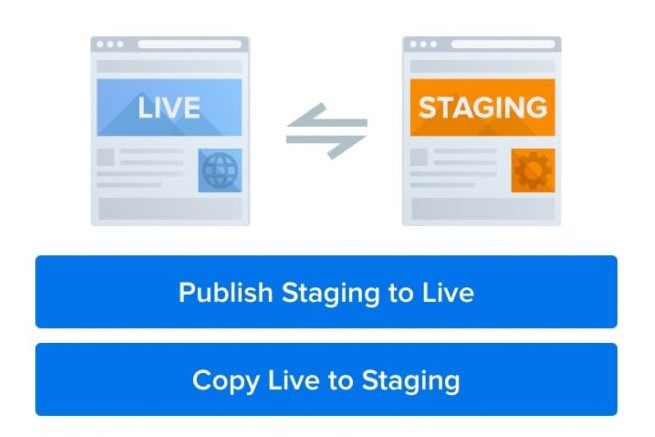
Frequently Asked Questions
Absolutely! PHP 8, WordPress 5.6, and their latest versions are seamlessly compatible. Upgrading to PHP 8 can significantly enhance the performance and security of your WordPress website.
While it’s challenging to provide an exact figure, recent polls suggest that approximately 60% of PHP developers are still utilizing PHP 7.4 or older versions. However, due to PHP 8’s notable improvements in performance, security, and enhanced features, an increasing number of developers are anticipated to transition to PHP 8 in the near future.
The latest iteration of PHP, PHP 8.2, made its debut in November 2022, introducing numerous new features and enhancements. These include a Just-In-Time (JIT) compiler, union types, attributes, named arguments, and improved error handling. In contrast, the preceding version, PHP 7.4, released in November 2019, lacks these advanced functionalities. However, it’s advisable to conduct thorough testing before transitioning to PHP 8, as certain older codebases may not be compatible with the new version.
You can verify your PHP version through various methods, such as:
1. Utilizing the phpinfo() function within a PHP file and executing it on your server.
2. Running the command “php -v” in the command line on your server.
3. Reviewing the version number in your server’s control panel or hosting account dashboard.
4. Employing an online PHP version checker tool.
PHP 7.3 has reached its End of Life (EOL) and is no longer receiving active support or updates. This means that the PHP development team has ceased providing bug fixes or security patches for this version, exposing websites and applications to potential security risks. To maintain the safety and currency of their website or application, users are strongly encouraged to upgrade to a supported version of PHP.
As of March 2023, the current stable versions of PHP are:
PHP 8.2
PHP 8.1.3
PHP 8.0.17
PHP 7.4.34
It’s important to note that PHP 8.0 will only be supported until November 26, 2023, and PHP 7.4 was supported until November 28, 2022. Therefore, upgrading to PHP 8.2, which is the most recent and secure version offering the latest features and improvements, is highly recommended.


